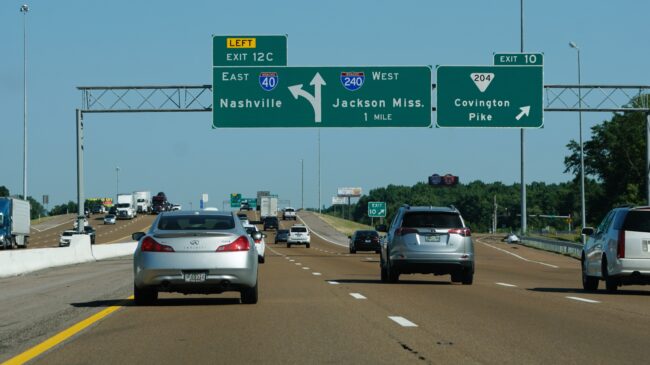Tennessee Gov. Bill Lee just signed the $3.3 billion Transportation Modernization Act passed by the state legislature.
“As families and businesses move to Tennessee in record numbers, we need a transportation plan to keep up with the pace,” Gov. Lee said in a press release today. “Our strategy will meet our transportation needs across rural and urban communities, without new taxes or debt. I commend the General Assembly for its partnership to prepare Tennessee for continued growth and economic opportunity.”
My Reason Foundation colleagues and I advised the governor’s staff and House and Senate transportation committee members on best practices for innovative infrastructure project delivery, tolling, and electric vehicle fees as the bill worked its way through the process, and I believe this is the most significant state transportation law passed in the country in the last five years.
The law, House Bill 321/Senate Bill 273, is important for several reasons. It authorizes variably-priced choice lanes, in which the tolls paid by drivers adjust based on the level of traffic congestion to ensure free-flowing travel conditions, to be implemented in Nashville, Knoxville, Memphis, Chattanooga, and the Tri-Cities region (Kingsport, Johnson City, and Bristol). It requires electric vehicles to pay a road usage fee comparable to what drivers of vehicles with internal combustion engines pay via gas taxes. The legislation also helps modernize the state’s project delivery by greenlighting more design-build (DB) projects and authorizing public-private partnerships (P3s) to be used for transportation projects throughout the state.
The bill began by tackling traffic congestion, a growing problem in metro areas throughout the state. As Tennessee’s population grows, the problem will only worsen. Thankfully, Tennessee lawmakers approved the choice lanes concept, which allows drivers to choose whether or not to pay a variable toll to use premium lanes. The variable pricing is designed to ensure that traffic flows smoothly in these lanes, even during peak rush hour travel periods. The choice lanes are optional; no drivers are forced to use them, and all drivers may continue to use the non-tolled lanes.
When some drivers switch to toll lanes, traffic in the non-tolled lanes is reduced. Therefore, travel times should improve for all motorists. While many states have added variably priced lanes to their largest metro areas, no state has attacked congestion in a systematic, statewide manner like Tennessee.
The Tennessee Department of Transportation (TDOT) plans to work with private consortiums to build choice lanes in the largest metro areas. A metro area’s toll lanes should eventually form a network, providing commuters with the option of paying for a reliable travel time on their journey from home to work and back.
The pricing of the choice lanes has the added benefit of generating an income stream to help pay for the construction and ongoing operation and maintenance of the toll lanes. Building choice lanes in urban areas will free up fuel tax money for the state to widen some congested rural Interstates from four to six lanes. To generate the funding needed to widen the same number of miles without the toll lanes would’ve required a 93-cent per gallon fuel tax increase, which was neither politically realistic nor a long-term solution to the state’s transportation challenges.
Choice lanes also enable metro areas to improve their transit systems. The toll lanes serve as virtual exclusive busways, allowing express bus and bus rapid-transit systems to provide faster and more reliable service than on congested highways. On-time performance is among the most important factors for current and potential transit riders. The buses will not need to pay to use the toll lanes. Tennessee’s taxpayers and commuters do not need to decide between funding better roadways or transit services—they can have both.
The bill also allows innovative project delivery. TDOT can use the design-build (DB) project delivery process for more roadway projects. DBs are the default method of building roads in most states. For example, Georgia uses design-builds to improve almost all its non-limited-access state highways. Yet Tennessee was capped on the number of DB projects it could enter each year. Design-build projects have a history of reducing costs and project delivery timelines. They are typically 20% less costly than the traditional procurement method, design-bid-build (DBB), because DBs combine three steps into one. In Tennessee, design-build projects are completed 50% faster than DBBs.
HB 321/SB 273 also streamlines the process for TDOT to enter into public-private partnerships. Highway P3s are long-term contracts between public and private entities for the provision of highways. Well-written P3 agreements shift some significant risks from taxpayers to the private partner and incentivize the private provider to deliver projects more quickly and efficiently than if they were undertaken by the state.
Specifically, public-private partnerships transfer construction and operating risks from taxpayers to the private sector. If a P3 project experiences cost overruns, the private consortium pays the costs. But if a non-P3 project experiences cost overruns, taxpayers instead are on the hook for the costs.
P3s also enable innovations. The variable-tolling used in the choice lane projects was first implemented by a private consortium in California as a way to manage traffic congestion.
Importantly, the bill makes all of these improvements to transportation without raising the gas tax or increasing the state debt. This transportation bill moves Tennessee in line with—and in some ways surpasses—the transportation laws in peer southern states like Florida, Georgia, North Carolina, Texas, and Virginia.
Gov. Bill Lee, the state legislature and TDOT should be congratulated for taking major steps toward creating a 21st-century transportation system for Tennessee that can also serve as a nationwide model.

